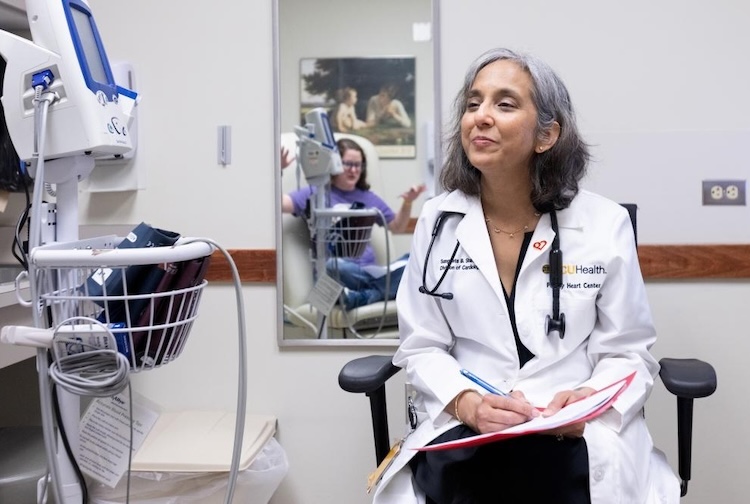COVID-19 and high blood pressure: Cause for concern?
VCU Health Pauley Heart Center expert shares insights on the effect high blood pressure can have on COVID-19.
December 13, 2023 (Getty Images)
(Getty Images)
This story was originally published on May 19, 2021. It has since been updated to include new information. For the latest COVID-19 news, check out VCU Health News. (Updated: Dec. 13, 2023)
By Konrad Solberg
While the relationship between high blood pressure and COVID-19 is still being studied, there's evidence that high blood pressure increases your risk of infection and the severity of symptoms.
High blood pressure is a chronic disease that requires management over many years to prevent complications such as coronary heart disease, stroke, kidney disease and heart failure.
By following a heart healthy lifestyle and taking prescribed medications every day, high blood pressure can be well managed and your risk of complications can be significantly reduced.
Dave Dixon, M.D., professor at the Virginia Commonwealth University School of Pharmacy and affiliate faculty at the VCU Health Pauley Heart Center, spoke with VCU Health News about the effect high blood pressure can have on COVID-19.
Does high blood pressure increase your risk of getting COVID-19?
Yes, having high blood pressure, especially if untreated or not well controlled, is associated with increased risk of infection. It's not quite clear as to why or how, but chronic conditions, such as high blood pressure and obesity, can weaken the immune system, making you more susceptible to infections.
Does your blood pressure play a role in how ill you'll get?
It's not entirely clear, but it does seem that uncontrolled blood pressure is linked to more severe COVID-19.
If you get COVID-19, can it affect your blood pressure?
The short answer is: yes. Infection places your body under significant stress, so an increase or decrease (if you're severely ill) in blood pressure may occur — especially if the infection worsens your kidney function.
There's also some evidence that the risk of developing high blood pressure increases following COVID-19 infection when compared to influenza (flu) infection. Be sure to have your blood pressure checked periodically in the months following a COVID-19 infection.
Can your blood pressure meds affect the severity of COVID-19?
There was some concern early on that certain groups of drugs, ACE inhibitors and ARBs, may increase the risk of COVID-19 infection by increasing the availability of binding sites for the virus. However, randomized trials have concluded that ACE inhibitors and ARBS are safe to use. So, no, blood pressure medications do not appear to affect the severity of COVID-19.
What are the best ways to control your blood pressure if you get COVID-19?
Monitor your blood pressure if you are at home, but make sure you are using a monitor that's validated. This just means the monitor has been verified to be clinically accurate. The website validatebp.org is a great resource, as well as your local pharmacist. Second, continue to take your blood pressure medications as prescribed unless your doctor says otherwise. Lastly, stay well hydrated and follow a heart-healthy diet.
What are the best ways people with blood pressure problems can protect themselves from getting COVID-19?
Get vaccinated! An updated COVID-19 vaccine is now available that covers more recent virus strains. The Centers for Disease Control and Prevention recommends that everyone six months of age or older should get the updated COVID-19 vaccine. Check with your local pharmacy or health department to get vaccinated.
Can the COVID-19 vaccine affect your blood pressure?
The COVID-19 vaccine does not appear to directly affect blood pressure. However, a very small number of individuals may experience an increase in their blood pressure if they are extremely anxious or have a strong pain response when they get the vaccine.
Alternatively, a sudden drop in blood pressure could occur in the very rare case of a severe allergic reaction to the vaccine (anaphylaxis). In either case, waiting 10-15 minutes after receiving the vaccine is reasonable, as these very rare reactions usually occur within minutes of getting the vaccine.
Will the vaccine impact the effectiveness of your blood pressure meds?
Based on the available evidence at this time, no.
Are people with high blood pressure more likely to experience adverse reactions to the vaccine?
Based on the available evidence at this time, no.
Every heart is unique. So that's how we treat them at VCU Health Pauley Heart Center.
Check out VCU Health News for the latest COVID-19 news.




